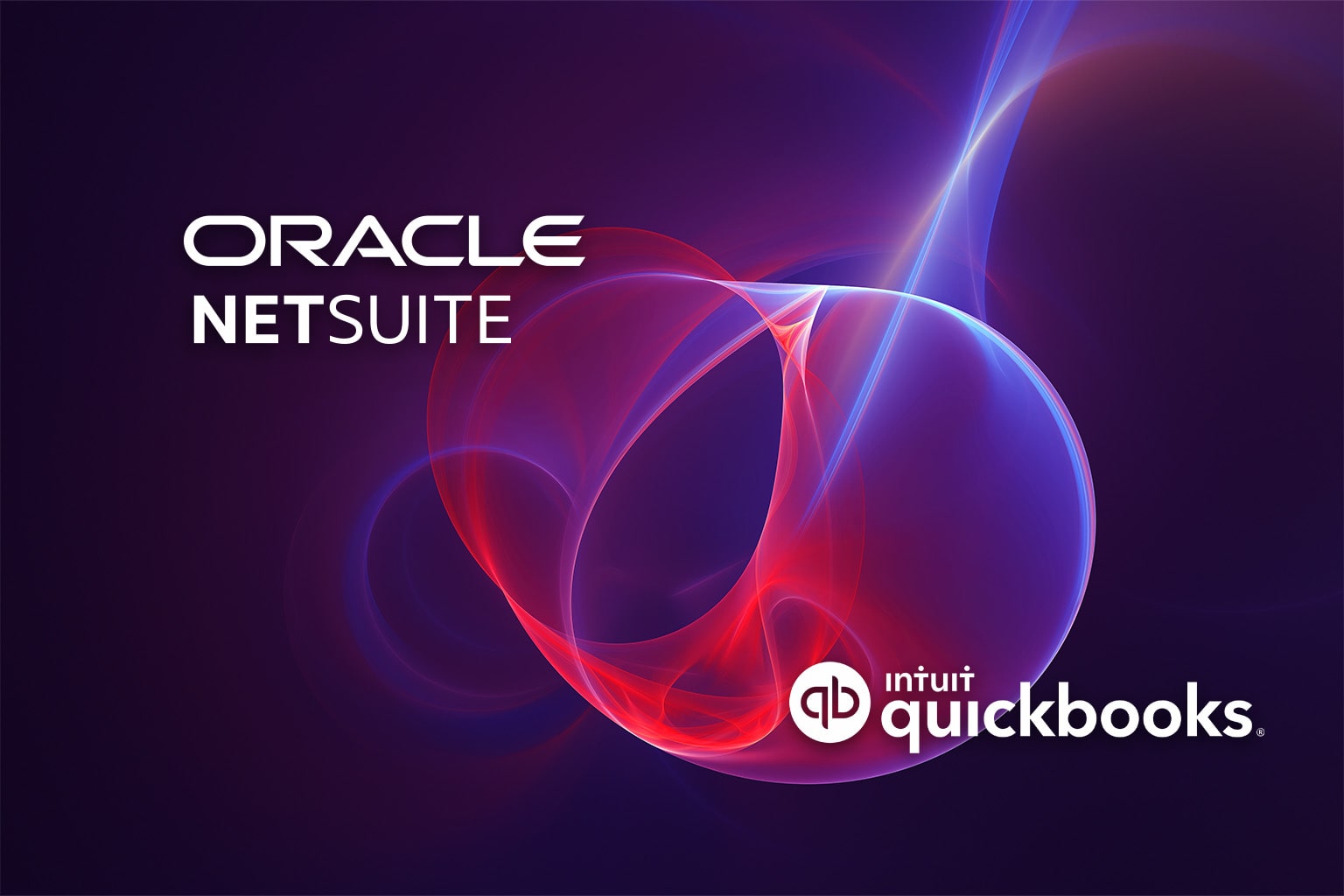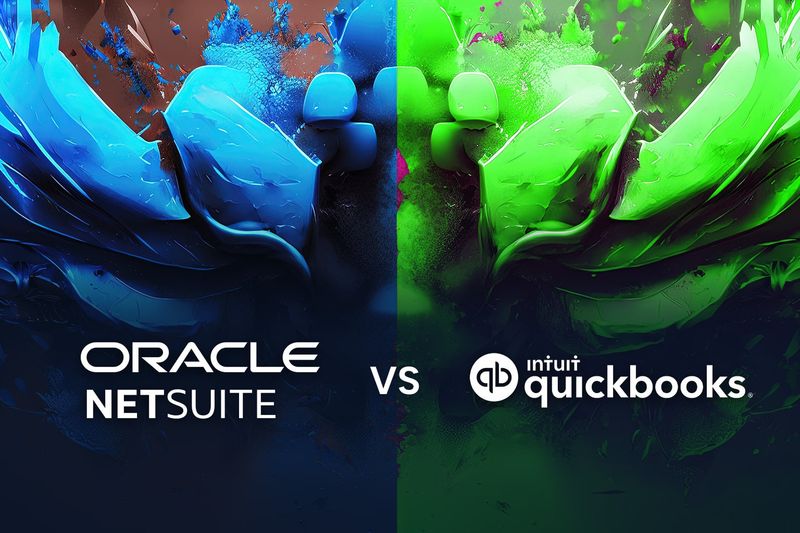Growing companies discover sooner than later that commercial-grade financial software have hit their limits (and at the most crucial times).
Spreadsheets, manual transactions, and incompatible software stacks completely fail when you’re doing serious business — underscoring a viewpoint shared by leading enterprise organizations and tech publications alike:
NetSuite is a much more integrated and robust financial management software than QuickBooks Enterprise (and way more than QuickBooks Online) — and arguably the best in the accounting software market.
In this comprehensive comparison guide of NetSuite vs. QuickBooks in 2023, we’ll dive deep into the features and capabilities of these two popular accounting software solutions.
Short Summary
- NetSuite and QuickBooks offer different feature sets catering to varying business sizes.
- NetSuite is an all-in-one platform to increase operational efficiency in other facets of business, including human capital management, payroll solutions, CRM capabilities, ecommerce & retail features, professional services automation, project management, and much more.
- NetSuite handles complex accounting needs, revenue management, powerful automations, and real-time data reporting.
- NetSuite’s more comprehensive and integrated experience enables businesses to enjoy smoother and more powerful integrations, ensuring their software ecosystem works harmoniously under one huge umbrella.
- NetSuite is infinitely scalable, whereas QuickBooks caps out once your business grows to a certain size.
NetSuite and QuickBooks: Understanding the Basics

NetSuite and QuickBooks are both accounting software solutions, but they cater to different business sizes and needs and perform at remarkably different levels.
What is NetSuite?
NetSuite, by Oracle, is a cloud-based enterprise resource planning (ERP) system designed for growing and mid-sized businesses, offering advanced features such as financial management, inventory management, and customer relationship management.
Oracle NetSuite was born in the cloud, making it the right choice for businesses looking for easy access to their data and avoiding the headache of on-premise and desktop solutions.
As a modular system, NetSuite is built to grow with your business. Choose what features you need as your business matures and tallies up a higher headcount.
What is QuickBooks?
QuickBooks is a typical first step designed for small businesses and startups, focusing on basic accounting functions and providing a cost-effective financial management tool.
You can bring transactions from bank accounts and credit cards and generate reports like P&Ls, income statements, and balance sheets.
While NetSuite ERP offers a comprehensive suite of enterprise applications, QuickBooks is available in various versions, such as QuickBooks Online, QuickBooks Desktop, and QuickBooks Enterprise, catering to various business requirements and stages of growth.
QuickBooks Online
QuickBooks Online is a cloud-based application specializing only in accounting. Anything outside of the accounting scope is riddled with limitations.
You’ll need additional software and integrations to perform advanced functions. You may even need to export your data and manually manipulate spreadsheets to extract detailed reporting.
QuickBooks Enterprise
QuickBooks Enterprise operates on your desktop. You may need to work with a vendor to host and access your data outside your office. It struggles with automating common business processes like subscription billing, revenue recognition, and asset management.
With an on-premise QuickBooks solution, you run into the danger of perfomrance degradation. Once you’ve entered around 10,000 records, QuickBooks will slow down and take much longer to launch.
However, the more data enters your QuickBooks system, the more you increase the potential for performance bottlenecks. The general rule is that once you hit 10,000 names, you will start to experience slowdowns, yet it can start happening even earlier than that. Now, take into consideration the number of employees that are using the system and you’ll notice how much longer it takes for QuickBooks to launch.
QuickBooks Enterprise has a rigid chart of accounts that restricts the capacity to efficiently record transactions and arrange them according to your unique financial framework of assets, liabilities, revenue, and expenses.
Financial Management Showdown: NetSuite vs. QuickBooks

NetSuite and QuickBooks offer a range of features regarding financial management, but there are some key differences.
QuickBooks provides basic features such as:
- Customer Invoicing
- Accounts Receivable
- Accounts Payable
- Financial Reporting
This makes it a suitable choice for small businesses with straightforward accounting needs. It simplifies cash flow management, online bill payment, future payment scheduling, and due date tracking, catering to the needs of small startups and property management enterprises.
NetSuite provides cutting-edge solutions for key accounting functions, including:
- Customer Invoicing
- Accounts Receivable
- Accounts Payable
- Financial Reporting and Analytics
- Complex inventory management
- General Ledger (GL)
- Chart of Accounts
- Cash Management
- Fixed Assets
- Revenue Recognition
- Multi-Entity and Global Accounting
- Audit and Compliance
Moreover, NetSuite offers many additional features to make data collection and analysis easier. These include more reporting options, access to key performance indicators (KPIs), and fixed asset purchase tracking.
Let’s dig even deeper into NetSuite’s financial capabilities vs that of QuickBooks.
Revenue Recognition

NetSuite offers comprehensive and flexible revenue recognition capabilities suitable for complex accounting scenarios, making it a preferred choice for growth-driven organizations.
NetSuite’s Revenue Recognition Capabilities
- Provides robust revenue recognition functionality suitable for complex accounting requirements.
- Supports advanced revenue recognition methods such as multi-element arrangements, subscription-based, and project-based revenue recognition.
- Allows you to set up and automate complex revenue recognition rules based on various criteria, such as milestones, deliverables, or specific events.
- Offers comprehensive reporting and analytics capabilities to track revenue recognition across different dimensions like time, geography, product lines, or customer segments.
QuickBooks Revenue Recognition Capabilities
- Supports simple revenue recognition based on standard accounting principles like accrual or cash basis.
- Allows you to create invoices and record revenue transactions, but it may not handle more complex scenarios or revenue recognition methods.
- While QuickBooks provides basic financial reports, its reporting capabilities are not as extensive or customizable as NetSuite’s.
Billing
NetSuite’s billing capabilities are more comprehensive and suitable for businesses with complex billing needs, whereas QuickBooks offers simpler billing functionality targeted toward smaller businesses.
NetSuite’s Billing Capabilities (Powered by Paper Street Agreements)
With the Paper Street Agreements module, NetSuite can achieve the following:
- Supports various billing models, including one-time billing, recurring billing, usage-based billing, and milestone-based billing.
- Allows for creating customizable billing schedules, automatic generation of invoices, and management of billing terms and payment methods.
- Provides options for advanced billing management, such as consolidated billing for multiple entities or subsidiaries and automated revenue recognition tied to billing.
- Integrates with other areas of the system, such as sales orders, contracts, and financials, providing a seamless end-to-end billing process.
QuickBooks Billing Capabilities
- Supports basic billing functionality, such as creating and sending customer invoices.
- Allows to customize invoice templates, including company branding and personalized messages.
- Provides basic options for managing payment terms, accepting online payments, and tracking customer payments.

Do you know the true health of your business?
Get a clearer vision of where your business stands and where it could go with a Business Process Scorecard.
General Ledger
NetSuite’s General Ledger Capabilities
- Provides advanced GL functionality, including multi-entity and multi-currency accounting support, enabling businesses with complex financial structures to manage their accounts effectively.
- Allows for a flexible chart of accounts setup and provides customizable financial statements and reports, enabling businesses to analyze their financial data in depth.
- Supports advanced features like allocations, intercompany transactions, and comprehensive audit trails, ensuring accuracy and control over financial processes.
- Seamlessly integrates with other modules, such as Accounts Payable, Accounts Receivable, and Inventory, providing a unified and centralized view of financial data.
- With NetSuite Multi-Book engine, you can record transactions, perform revenue recognition, manage expenses, allocate profits and losses, and handle other financial activities across different books within a single unified system.
QuickBooks General Ledger Capabilities
- Provides essential GL features such as creating and managing a chart of accounts, recording journal entries, and generating financial statements.
- Standard financial reports such as profit and loss statements, balance sheets, and cash flow statements are offered.
- May have limitations in handling more complex accounting needs, such as multi-entity accounting or extensive customization of financial statements.
Accounts Payable

NetSuite’s Accounts Payable Capabilities
- Provides features for managing vendor records, tracking and managing purchase orders, receiving and matching invoices, and processing payments.
- Allows to automate the accounts payable process through workflows and approvals, improving efficiency and reducing manual errors.
- Supports advanced capabilities such as multi-currency management, multi-entity processing, and intercompany transactions, making it suitable for businesses with complex financial structures.
QuickBooks Accounts Payable Capabilities
- Provides features for managing vendor records, recording and tracking bills, and making payments.
- Allows for customizing payment terms, tracking due dates, and generating basic accounts payable reports.
- Lacks advanced features present in NetSuite, such as multi-entity processing or complex intercompany transactions.
Accounts Receivable
NetSuite’s Accounts Receivable Capabilities
- Provides features for managing customer records, generating and sending invoices, tracking customer payments, and managing collections.
- Configure dashboard, reports, and KPIs to display AR data in real-time.
- Offer self-service access to customers on POs and inventory.
- Automatically send emails to customers
- Forecast and record revenue with Advanced Revenue Management
QuickBooks Accounts Receivable Capabilities
- Provides features for managing customer records, creating and sending invoices, and tracking customer payments.
- QuickBooks allows for customization of invoice templates and basic tracking of outstanding customer balances.
Financial Reporting
NetSuite’s Financial Reporting Capabilities
NetSuite can achieve the following:
- Provides a wide range of pre-built financial reports, including income statements, balance sheets, cash flow statements, and more.
- Allows for customizable financial statements and reports, enabling businesses to tailor them to their specific needs and requirements.
- Offers advanced reporting features such as drill-down capabilities, comparative analysis, and filtering options to analyze financial data in-depth.
QuickBooks Financial Reporting Capabilities
- Offers standard financial reports such as profit and loss statements, balance sheets, and cash flow statements.
This makes NetSuite a more suitable choice for businesses with more complex financial management needs, like manufacturers, distributors, and investor-backed SaaS companies.
Let’s take a look at a side-by-side in this table:
| NetSuite | QB Online | QB Desktop | |
| Customer | SME (small and medium-sized enterprises) with $1M+ revenue | Small to medium-sized (up to 25 users) | Small to medium-sized (up to 40 users) |
| Made for | Businesses w/ complex processes (e.g., inventory management, subscription billing, etc.) | Businesses outsourcing accounting or doing simple processes in-house | Businesses outsourcing accounting or doing simple processes in-house |
| Scalability | Infinite scalability | Capped, can extend with 3rd party apps | Capped, can extend with 3rd party apps |
| Modular | Yes | No | No |
| User permissions by role | Customizable | Preset roles | Preset roles |
| Cost | Custom quote based on business needs | Advanced starts at $200/mo | $2250/yr |
| Automation | Advanced | Limited | Limited |
| Reporting | Cash FlowProfit & LossConsolidated Reporting (Intercompany)Multicurrency Reports | Cash FlowProfit & Loss | Cash FlowProfit & LossInventory |
Inventory and Supply Chain Management Capabilities
When it comes to inventory and supply chain management, NetSuite outshines QuickBooks with its more comprehensive features and better control and visibility for businesses.
NetSuite leveled up with the powerful RF-SMART module tracks inventory levels, locations, and movements in real-time. It provides accurate information about item quantities, locations, and availability. This enables businesses to monitor their inventory levels and make informed decisions closely.
In particular, NetSuite offers industry-specific features for the manufacturing industries, such as:
- Work order data
- Bill of materials (BOM)
- Order management
- Supply chain management
- Inventory control
- Demand-based replenishments
These advanced capabilities allow businesses to optimize their inventory management processes, ensuring they always have the right inventory levels and can respond to changing market conditions effectively.
Human Capital Management and Payroll Solutions

Comparing human capital management and payroll solutions between NetSuite and QuickBooks reveals that NetSuite offers more advanced features and flexibility.
While QuickBooks facilitates paycheck generation, accounting report formatting, tax clearance, payroll tracking and processing, and automatic tax payment and form filing capabilities, it lacks some features available in NetSuite, such as Core HRIS and the employee center.
On the other hand, NetSuite’s Human Capital Management (HCM) module comprises Core HRIS, payroll, and the employee center, providing a more comprehensive solution for businesses with complex human resource and payroll needs.
This makes NetSuite a better choice for service-based businesses that require more advanced human capital management and payroll solutions.
Customer Relationship Management (CRM) Face-off

In the realm of customer relationship management (CRM), both NetSuite and QuickBooks offer modules, but NetSuite takes the lead with its more comprehensive and integrated solution for managing customer relationships.
While QuickBooks lacks a dedicated CRM module, NetSuite’s CRM capabilities include:
- Sales automation
- Customer service
- Marketing automation
- Partner relationship management
Organizations requiring reliable CRM and ERP solutions would benefit from using NetSuite, as it offers a more robust and feature-rich CRM module compared to QuickBooks. This enables businesses to manage customer relationships more effectively and drive better customer engagement and satisfaction.
Ecommerce and Retail Features: NetSuite vs QuickBooks

NetSuite offers a more robust and scalable omnichannel commerce solution than QuickBooks.
NetSuite’s comprehensive solution includes:
- Ecommerce
- Point of sale (POS)
- Commerce marketing
- Order management
- Product content
This enables businesses to manage their online and offline sales channels more effectively and deliver a seamless customer experience.
NetSuite’s end-to-end cloud software solutions are particularly beneficial for industries like manufacturing and distribution.
These industries can leverage their advanced ecommerce capabilities to stay competitive in the market. In contrast, QuickBooks’ more basic ecommerce features may not be sufficient for businesses with complex or rapidly growing ecommerce needs.
Professional Services Automation & Project Management

NetSuite delivers professional services automation (PSA) and project management capabilities, while QuickBooks lacks these advanced features, making NetSuite a better choice for service-based businesses. NetSuite’s PSA/Project Management module provides organizations with the following tools:
- Project management
- Resource management
- Timesheet management
- Expense management
These features facilitate efficient project completion and enhance overall business operations.
These capabilities allow businesses to manage their projects more effectively, optimizing resource allocation, tracking progress, and ensuring timely completion.
In comparison, QuickBooks’ limited project management features may not be sufficient for businesses that require more advanced project management and professional services automation solutions.
Integrations & Third-Party Compatibility

Both NetSuite and QuickBooks offer integration options with third-party software, but NetSuite provides a more seamless and extensive integration experience.
Integrations are essential for businesses to augment their accounting systems’ capabilities and enhance their performance. For example, NetSuite integrates with Tipalti, providing real-time visibility into cash flow, spending patterns, and vendor invoices — just to name a few features.
To expand the scope even further, NetSuite can be used to connect marketing to sales. For example, NetSuite seamlessly integrates with HubSpot using an easy-to-use HubSpot Connector to sync prospect and customer data between the two systems.
NetSuite ERP and QuickBooks Online provide integration flexibility with applications and third-party software, allowing businesses to extend their software’s functionalities and improve their overall efficiency.
However, NetSuite’s more comprehensive and integrated experience enables businesses to enjoy smoother and more powerful integrations, ensuring their software ecosystem works harmoniously under one huge umbrella.
Pricing Models & Number of Users

When comparing pricing models and user accessibility between NetSuite and QuickBooks, it is essential to consider the differences in costs and user limits for each software. QuickBooks is more economical than NetSuite, especially for smaller businesses, with four plan offerings:
- Simple
- Essentials
- Plus
- Advanced
Pricing is contingent on the number of users and chosen software level, with QuickBooks Enterprise starting at approximately $104/month/user and QuickBooks Online Advanced at around $200/month.
NetSuite uses a custom pricing model designed to fit each organization’s requirements, goals, and budget. To scope out pricing, contact a NetSuite Solutions Partner to get a personalized demo and price sheet.
Regarding user accessibility, NetSuite offers an unlimited number of users, whereas QuickBooks is limited to a certain number. For example, QuickBooks Desktop Pro and Premier users can upgrade to Plus to receive unlimited customer support, data backups, and upgrades, with QuickBooks Premier Plus 2022 supporting up to five users.
Ease of Use and User Experience
Both NetSuite and QuickBooks offer user-friendly interfaces and dashboards, making it easy for users to navigate and manage their business processes.
NetSuite’s advanced features may require a steeper learning curve for some users. Still, its intuitive and customizable interface ensures that users can easily adapt to the software and take advantage of its advanced functionality.
On the other hand, QuickBooks offers a simpler interface that may be more suitable for businesses with less complex accounting needs.
Security and Compliance

Security and compliance are critical aspects for businesses when choosing accounting software. Both NetSuite and QuickBooks prioritize security and compliance, but NetSuite offers more advanced features and a stronger control environment for businesses with complex compliance requirements.
NetSuite has met various audit and security standards, including:
- SOC 1
- SOC 2
- PCI-DSS
- EU-US Privacy Shield framework
It also regularly completes SOC 1 Type II and SOC 2 Type II audits and issues corresponding reports. Additionally, NetSuite has ISO 27001:2013 and PCI DSS certification, as well as a defined information security management system that is compliant with ISO 27000 and NIST 800-53 standards. This demonstrates NetSuite’s commitment to providing a secure and compliant software solution for businesses.
Going Big? Then, Go NetSuite.

In a nutshell, QuickBooks is accounting software — period. NetSuite is a complete all-in-one business management and growth solution with complex financial competencies.
NetSuite’s advanced features, comprehensive functionality, and scalability make it a better choice for growing and mid-sized businesses, while QuickBooks is more suited to small businesses and startups with entry-level accounting needs.
If you want to take the reigns on financial management, inventory control, customer relationship management, and overall business growth, then NetSuite is the best choice.
Frequently Asked Questions
What is the difference between NetSuite and QuickBooks?
NetSuite is a more comprehensive business management solution with advanced features such as CRM, ERP, and e-commerce solutions, while QuickBooks is a simpler accounting program for basic tasks.
How much does NetSuite cost per month?
NetSuite packages are custom-built to serve the needs, goals, and budgets of growing businesses.
Which software offers more advanced inventory and supply chain management features?
NetSuite provides more advanced inventory and supply chain management features than QuickBooks.
Does NetSuite provide better customer relationship management (CRM) capabilities than QuickBooks?
Yes, NetSuite provides superior customer relationship management capabilities when compared to QuickBooks.
How do the pricing models and user accessibility differ between NetSuite and QuickBooks?
QuickBooks is at a lower price point, with user limits depending on the plan.
NetSuite offers unlimited users at varying costs, depending on your needs. Get a quote from a NetSuite Solution Partner.



